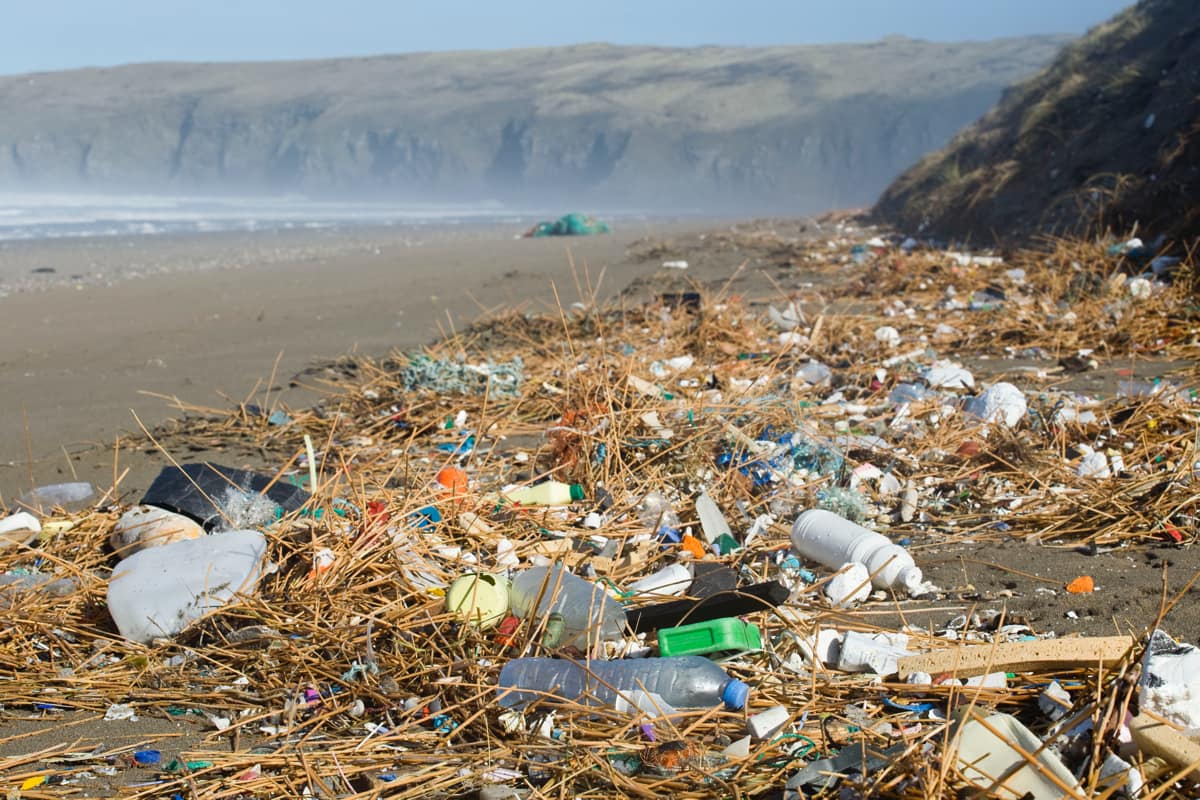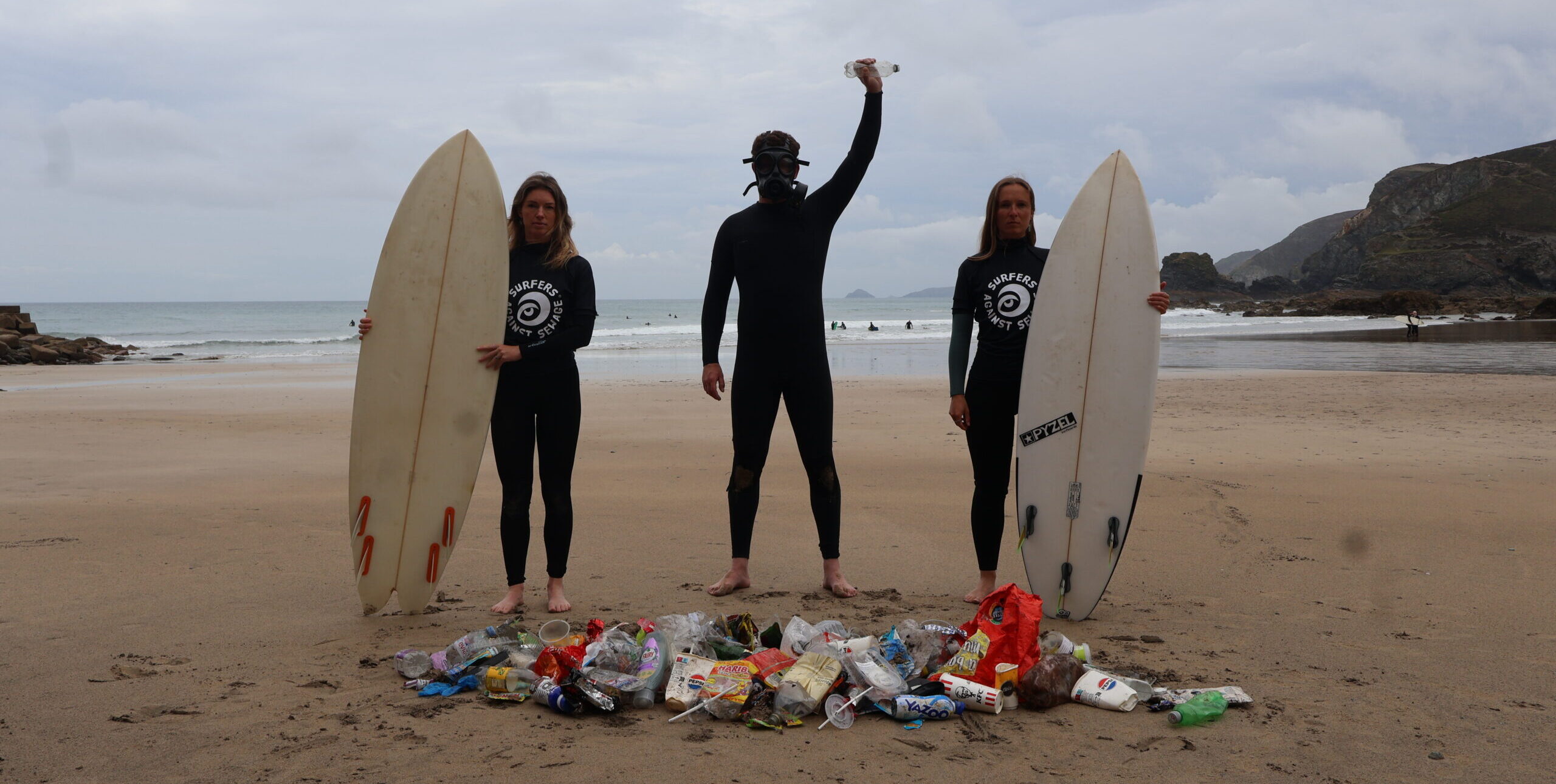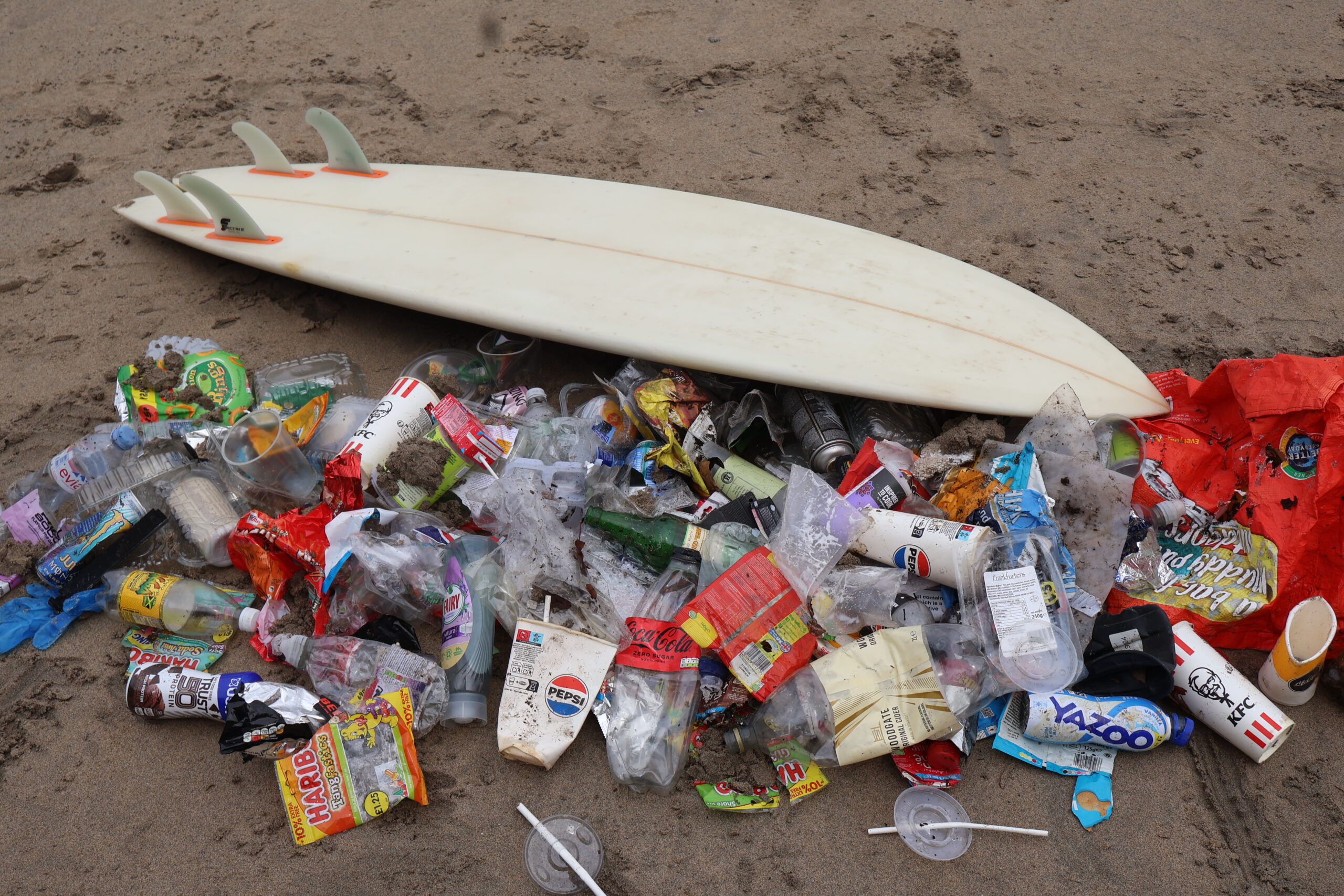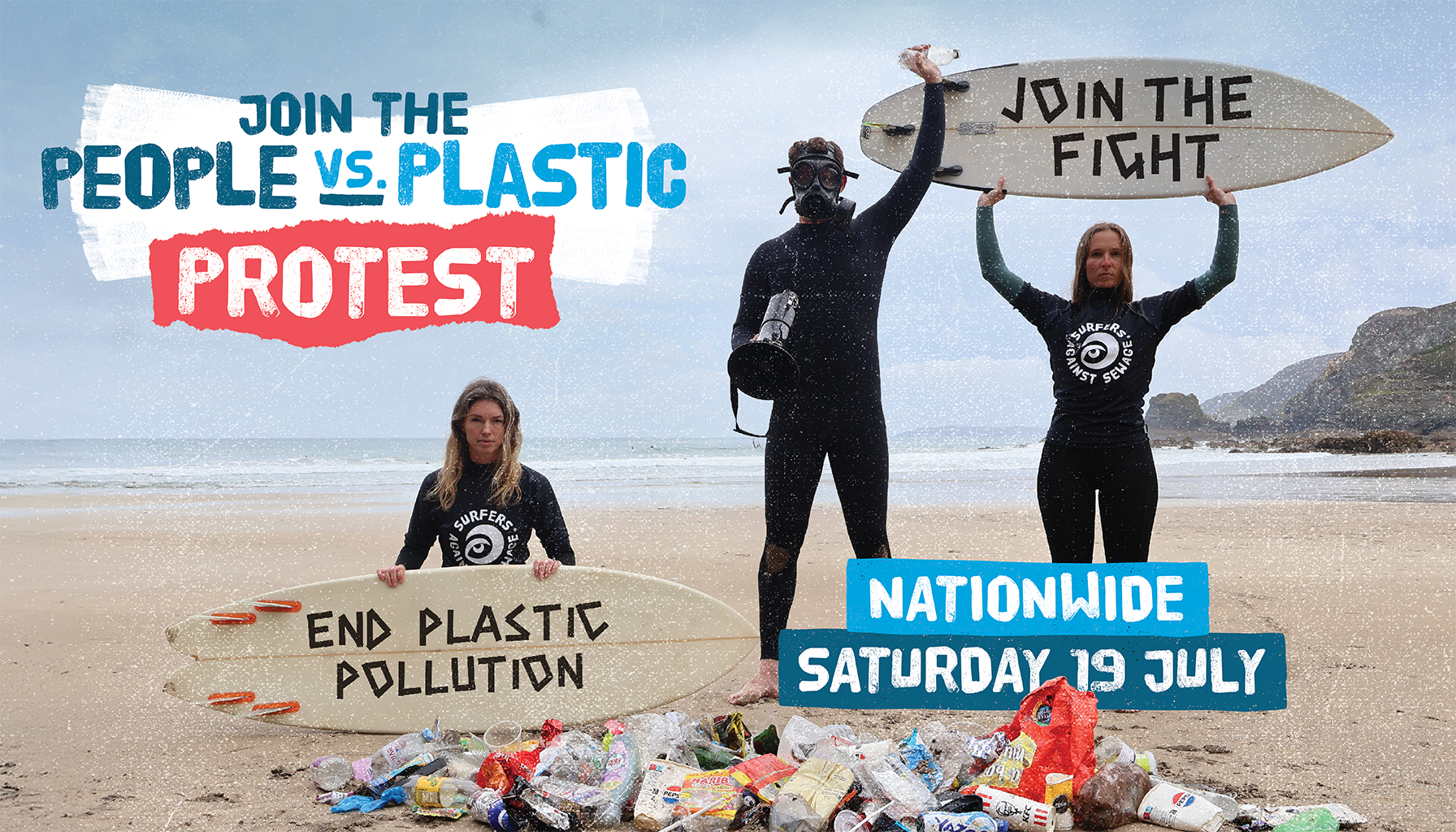
Ocean Plastic Pollution: How can we stop it?
The overproduction and consumption of plastic is polluting our planet, contributing to the climate crisis, and harming public health. We know the science and have the solutions but require the political ambition and legislation to enact change. The upcoming Global Plastics Treaty provides an important opportunity to secure this, which is why there has never been a more important time to take action.
How much plastic is in the ocean?
Approximately 11 million tonnes of plastic enters the ocean every year. That’s the equivalent of us dumping 2,000 garbage trucks full of plastic into the world’s oceans, rivers, and lakes every single day. And it’s increasing every year.
Data from our annual, Million Mile Clean programme reveals an increase in pollution collected per mile each year. In 2025 so far, 40,942kg of pollution has been collected from 194,120 miles. In 2024, the Million Mile Clean collected 81,076 kg’s of pollution from 310,692 miles. Microplastics, originating either from pellets used to make plastic products, or broken-down plastic pollution are also becoming increasingly prevalent.
Without effective control measures, plastic waste flowing into the ocean is projected to triple by 2040.
See more plastic pollution facts
The effects of plastic pollution
This pollution is having a detrimental impact on people and planet.
Climate breakdown
Up to 99% of plastics are made from polymers derived from non-renewable hydrocarbons, mostly oil and natural gas. It is estimated that the production and incineration of plastic has pumped more than 850 million tonnes of greenhouse gases into the atmosphere. By 2050, those emissions could rise to 2.8 billion tonnes, completely undermining international climate targets.
Nature crisis
Plastic is a major threat to nature. An estimated 100,000 marine mammals and turtles and 1 million seabirds are killed by plastic pollution annually. A UK paper found 100% of stranded marine life washed ashore had plastic present in the digestive system, and studies now reveal that plankton ingest plastic leading to bioaccumulation up the food chain. Entanglements from discarded fishing gear and other marine plastic debris also cause thousands of deaths each year.
Human impact
But humans are only as healthy as our environment, and are impacted too with many of the consequences still unknown. Studies have found microplastics throughout the human body; from hearts to placentas and livers. Over 16,000 chemicals are used or present in plastics, of which 4,200 are identified as chemicals of potential concern with worrying links between these toxins and chronic health conditions.

What’s causing the plastic pollution crisis?
Countries like the UK – one of the largest importers of plastic globally – have committed to end plastic pollution by 2040. Yet plastic pollution in the ocean is projected to triple by 2040. Something doesn’t quite add up… Why?
Overproduction
The plastic pollution crisis is being caused by the systemic over production and over-consumption of non-essential single use, throwaway plastics, driven by the plastic and fossil fuel industries maximising profit over planet. Attempts to curb production are being blocked by a plastics industry that is benefiting from a linear economy.
For example, at the 2024 Plastics Treaty negotiations, fossil fuel lobbyists outnumbered national delegations, scientists, and indigenous peoples. It was therefore little surprise that nations with large fossil fuel and plastic industries derailed negations by refusing to sign an agreement that would reduce plastic production.
Policies that tinker around the edges
Government policies fail to tackle the root cause of the problem and are often over-reliant on recycling. Whilst recycling reduces both waste and carbon emissions, compared to incineration and landfill, the industry can currently only effectively recycle 2% of plastics. Plastic taxes have seen a reduction in virgin plastic use across some major retailers, but they cover few products.
Extended Producer Responsibility (EPR) is set to make polluters pay for collection and recycling costs, but implementation has been repeatedly delayed, and as a result of industry lobbying and political squabbles Deposit Return Schemes (DPS) are still not in place.
The UK lacks meaningful cross-cutting policies to cut plastic production at source. There have been no comprehensive policies to phase out hazardous chemicals in plastics and no real action taken to clean up the tide of microplastics suffocating the UK’s coasts.
Brands and retailers
Despite brands and retailers setting their own voluntary targets to reduce plastic pollution, we are still seeing our beaches flooded by the plastic produced by the big brands. Our Brand Audit found that just 12 producers were responsible for 70% of the branded plastic pollution found on UK beaches. Coca Cola, despite commitments to make at least 25% of all beverages returnable by 2030, remain the worst polluter 4 years in a row. Without legally binding rules and regulations these brands will simply not act.

How to stop plastic pollution in the ocean
Here’s what we, at Surfers Against Sewage (SAS), are calling for to end the plastic pollution crisis:
An ambitious Global Plastic Treaty
A Global Plastics Treaty (GPT) will likely be agreed this year. The GPT is a significant, legally binding international agreement aimed at addressing and ultimately ending plastic pollution. The treaty aims to phase out unnecessary plastics, including single-use items, and establish requirements for plastic production to reduce overall plastic waste.
Currently, the UK lacks mandated legislation to cut plastic production or consumption, especially for virgin plastics. This is why the upcoming GPT is so significant – it’s the first real opportunity to see targets in law for plastic reduction, which could turn the tide on plastic waste for good.
The second part of the fifth session (INC-5.2) is scheduled to take place from 5 to 14 August 2025 in Geneva. SAS will be attending to drown out the lobbyists, expose the polluters and bring community voices to the international stage – because what’s agreed globally will effect plastic policy domestically (at home).
Going into negotiations, we want the UK Government to remain an ambitious member of the High Ambition Coalition, a coalition of 117 countries committed to developing an ambitious international legally binding instrument. Post-treaty, the UK Government must then lead by example and rapidly implement the terms of the global plastics treaty through the introduction of national action plans that are centered on cutting plastic production at source.
National Actions Plans
2025-2027 will provide many influential moments to effect change; from the United Nations Global Plastics Treaty to the implementation of several domestic policies. The UK plastic policy landscape varies massively… While there are steps in the right direction, progress is piecemeal and inconsistent across the four nations which creates confusion and dilutes progress, therefore SAS believe national action plans should be created for each nation.
For example, England and (occasionally) Northern Ireland are aligning with UK-wide policy frameworks, while Welsh and Scottish administrations display varied ambition and pace.
- England and devolved nations (bar Northern Ireland) have banned plastic straws, cotton buds, stirrers, some single-use cutlery and plates.
- Wales has taken further steps, banning wet wipes and introducing legislation to ban all single-use plastics by 2026.
- Scotland stands out for its proactive but delayed circular economy measures, including robust infrastructure funding and plastic bans. However, tensions over the DRS have triggered financial disputes and governance instability.
- Wales leads on waste segregation and strategic planning, while England faces a contentious debate over incineration versus recycling.
We’re at a crossroads and need a map. With so many previously promised policies and unknown future legislation as a result of the soon-to-be agreed plastics treaty, the strategic focus must be on harmonisation and compliance.
Crucially, national action plans must deliver three clear outcomes:
- Cut plastic production: Set legally binding targets to cut plastic production, including targets to end the production of virgin plastics and the manufacture and sale of single use items, not just those made from plastic.
- Create a circular economy: Implement an effective Circular Economy centered on reuse and refill, including the implementation of an all in Deposit Return Scheme and introduction of binding reuse targets.
- Hold polluters to account: Hold Polluters to Account, by enforcing current laws and delivering Extended Producer Responsibility schemes that make the polluters pay.

How to take action against plastic pollution
The UK government has the chance to step up and become a world leader in tackling plastic pollution. There is no time left to waste.
To make this happen we need to show politicians that the public have had enough. When we come together, we’re an unstoppable force that government and big polluters can’t ignore.
On Saturday 19th July, we’ll be taking to the streets and beaches to demand an end to plastic pollution. Join The People vs Plastic protest to show the polluters that they can’t get away with it anymore.